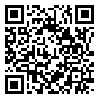Volume 9, Issue 1 (3-2021)
CPJ 2021, 9(1): 39-54 |
Back to browse issues page
Download citation:
BibTeX | RIS | EndNote | Medlars | ProCite | Reference Manager | RefWorks
Send citation to:



BibTeX | RIS | EndNote | Medlars | ProCite | Reference Manager | RefWorks
Send citation to:
zahed S, dortaj F, asadzadeh H, kadivar P, farokhi N. structure and validation of the Persian version of the Cognitive Load Questionnaire. CPJ 2021; 9 (1) :39-54
URL: http://jcp.khu.ac.ir/article-1-3375-en.html
URL: http://jcp.khu.ac.ir/article-1-3375-en.html
Allameh Tabatabaei University , F_dortaj@yahoo.com
Abstract: (8086 Views)
Cognitive Load Theory is one of the most powerful research frameworks in educational research. The main concern within this framework is to develop a proper instrument to measure cognitive load. Hence, the goal of this research was to investigate the reliability and validity of the Cognitive Load Questionnaire designed by Kelpsch, Schmitz and Seufert (2017). This questionnaire was administered to 206 seventh- and eighth-grade female students, in which they rated the amount of intrinsic, germane, and extraneous load of various learning tasks on a 7-point Likert scale. The reliability and validity of the questionnaire were examined and confirmed through Cronbach's alpha coefficient and t-test in which the quality of individuals' answers in different tasks were compared together. In addition, confirmatory factor analysis was performed using LISREL 8.80, to investigate factor structure of the questionnaire. The results showed that the questionnaire has desirable reliability and validity to measure different types of cognitive load. The results of confirmatory factor analysis also revealed a three-factor structural model whose fit indices suggested a desirable fit with the data, thus corroborating the three-factor structure of the cognitive load questionnaire. Therefore, this questionnaire can be a proper measure to assess different types of cognitive load in seventh and eighth grade students.
Keywords: Cognitive load theory, Measurement of types of cognitive load, Factor structure, Validity, Reliability
Type of Study: Research |
Subject:
Special
Received: 2021/01/9 | Accepted: 2021/05/16 | Published: 2021/06/1
Received: 2021/01/9 | Accepted: 2021/05/16 | Published: 2021/06/1
Send email to the article author
| Rights and permissions | |
 |
This work is licensed under a Creative Commons Attribution-NonCommercial 4.0 International License. |






